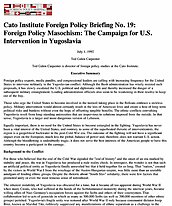Those who urge the United States to become involved in the turmoil taking place in the Balkans embrace a reckless policy. Military intervention would almost certainly result in the loss of American lives and create a host of long-term political risks and burdens without even the hope of offsetting tangible benefits. The ethnic conflicts convulsing Yugoslavia result from long-standing animosities that are impervious to solutions imposed from the outside. In that sense, Yugoslavia is a larger and more dangerous version of Lebanon.
Equally important, there is no need for the United States to become entangled in the fighting. Yugoslavia has never been a vital interest of the United States, and contrary to some of the superheated rhetoric of interventionists, the region is a geopolitical backwater in the post-Cold War era. The outcome of the fighting will not have a significant impact even on the European, much less the global, balance of power and, therefore, does not warrant U.S. action. Although the bloodletting is undoubtedly tragic, it does not serve the best interests of the American people to have this country become a participant in the carnage.


